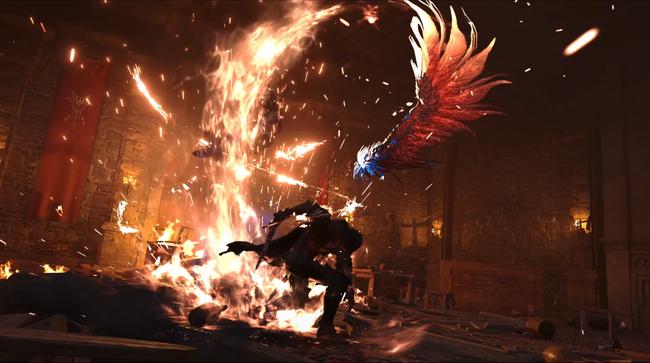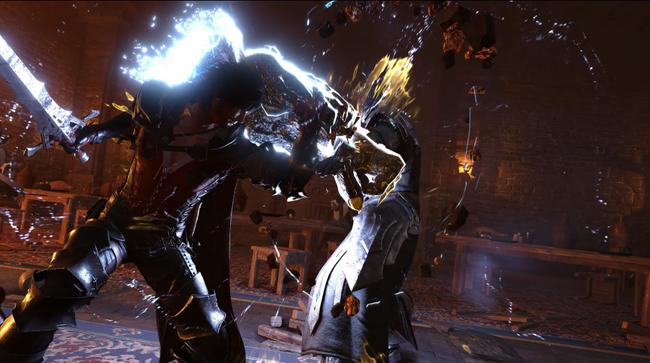
Does it really matter if Final Fantasy XVI doesn’t have a traditional party system?
As we await further news of Final Fantasy XVI, and with a PlayStation State of Play stream that could host an update on the way, my thoughts have been drifting back to what we might expect from the game. One question around how the game will play is also a sticking point for some fans: what about parties?
By which I mean: will FF16 have a traditional ‘party’ system, where players will take direct control of more than one character? Will Clive journey for an extended time with a bunch of allies? This has been a Final Fantasy franchise staple - but from the little we’ve seen of FF16, I increasingly believe this could be the game to break that tradition.
All of this is conjecture and supposition, of course. We’ll learn more soon. But why do I believe that? Well, let me explain what’s feeding these thoughts.
When you look at the scant footage of FF16 released so far, we’ve got what appears to be an action-focused combat system where summon powers at least partially take the form of small moves executed mid-combat. In the first trailer, we see Phoenix’s wing summoned to send enemies flying into the air ready to be air comboed, and Titan’s fist used to slam into enemies to break their guard. Scrutinizing that footage last year, I also felt we saw what sure looks like a jump-cancel to follow up on a launcher attack. Basically, it’s appears far more dynamic and action-focused than the more traditional combat on offer in FF7 Remake. It looks more like a pure action game.
All of this makes sense when some of the likely staffing of FF16 is considered. You can, after all, learn a lot about what a game might be like by examining who is making it. That’s why we previously featured a large profile on FF16 director Hiroshi Takai - but in this article, I want to look at one other staffer in particular.
A few years ago it was widely reported that designer Ryota Suzuki had left Capcom and joined Square Enix, and was working as the Battle Director on a large-scale project within the business division led by Naoki Yoshida, FF16’s producer. While Square Enix hasn’t offered confirmation, it appears inevitable that Suzuki is the combat lead of FF16.
Why does this matter? Well, Suzuki’s history is telling: he was most recently a design lead on Devil May Cry 5. Before that, he worked on the truly legendary Dragon’s Dogma. These are single-character games - though of course Dragon’s Dogma has its ‘pawn’ system where the protagonist is joined by AI companions. These are the sorts of combat systems Suzuki has the most history with, and one can definitely see Devil May Cry DNA in the footage we’ve seen of FF16’s combat so far.

Suzuki could naturally be working with others at Square Enix to blend a more traditional party system with the type of combat he’s known for. But then the footage we’ve seen so far of FF16 seems decidedly solo-focused. Only in one clip do we see another AI-controlled character joining Clive in combat - and it’s awfully brief.
Then there’s Naoki Yoshida himself. In 2016, he called out God of War and Horizon Zero Dawn as the sorts of games he was “frustrated” Square Enix wasn’t making. I wouldn’t be surprised to see Yoshida make a game in that sort of vein. If FF16 has a lot in common with God of War, it’d make sense. Part of the strength of these games is with their resolute focus on having players identify with a single protagonist. That doesn’t stop those games having a strong supporting cast - but it does mean there is a more laser-tight focus on the lead than is traditional in FF.
In context of the series, I also feel it makes sense. More than anything else, FF15 was a love letter to friendship and the concept of the unbreakable bonds of a party of four Warriors of Light. A more solitary protagonist, on a mission of revenge, would severely differentiate it. And even though FF15 was a story about a party, we mustn’t forget that it was first released without any party control - just some AI buddies. In that sense, it feels as though even with the story focus, party combat was an afterthought there, too..
To be clear, my suggestion isn’t that Clive would be a complete loner. Clearly he’s going to have friends - we already have a couple of other FF16 characters that’ll play a key role in the story revealed. There will inevitably be others; relationships are a key piece of Final Fantasy that cannot be assailed. Some guest characters will inevitably come and go, as the likes of Aranea and Iris did back in FF15.
What I doubt is that Clive will ever form the head of a permanent party of adventurers, or that players will have direct control over anybody other than Clive. I just feel the stars are aligning for FF taking a step away from those systems for this entry.
The question is, if this is the case… does it matter?

Whenever I’ve casually suggested my belief that FF16 might take this direction before, to some fans it is clearly blasphemy. But I don’t see too much of an issue, myself. The greatest strength of Final Fantasy is that it’s always changing and growing, and quite often taking cues from other popular games of the era. It’s natural FF might look to a game like God of War or The Witcher 3 for guidance - and this generally shouldn’t preclude the delivery of an original, exciting, and thoroughly FF-worthy experience.
Furthermore, there’s a secondary factor: the ongoing adventures of Cloud and his party of buddies in FF7 Remake. We’re also awaiting the second part of that, where that game’s team will continue to build on the best modern interpretation of ATB turn-based and party-driven combat to date - which means fans that want that sort of experience will be well-served in relatively short order.
That’s my argument and reasoning, at least. I understand that for others the issue is more fraught, however. What do you want from FF16’s combat system? Would the lack of a party be a deal breaker? If nothing else, it’s fun to think about while we await the reveal of more information - including a confirmation of how Clive’s adventure will play.